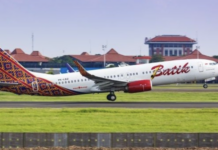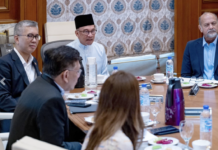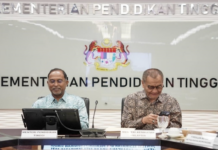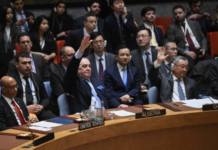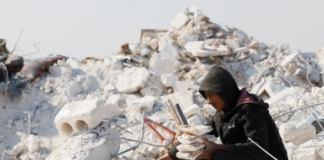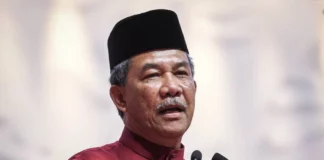
AMBASSADOR Bai Tian, who will be heading home next month, reportedly to take up a higher posting in Beijing after serving as top Chinese diplomat here for nearly three years, has achieved most of the goals he has set out for himself.
Indeed, he has notably created a new era in Malaysia-China relations.
One of the most important work he has done as China’s ambassador to Malaysia since late 2017 is to engage with the local Malay community in building up people-to-people relations
– an aspect unfulfilled during the times of his predessasors.
The energetic 49-year-old set himself three targets in his new job when he first arrived: working towards elevating China-Malaysia ties to a higher level, hastening economic cooperation and building closer people-to-people relations.
In the past three years, the embassy has sponsored talks on China at Malay-majority seminars and encouraged China’s state companies in Malaysia to carry out community work in various Malay villages.
During the Hari Raya period in 2019, he surprised many by hosting a Hari Raya Open House at the Chinese Embassy. This was the first such do organised by a non-Muslim embassy. The function lured all ethnic groups – mainly Malays.
“He is respected by all races. He mixes around. A lot of people – including Malays – want to do farewells for him now,” says Tan Sri Ter Leong Yap, president of the Associated Chinese Chamber of Commerce and Industry of Malaysia.
“He is warm, friendly, hardworking and down to earth. When we telephoned him, he would meet to talk – even at an ordinary restaurant. No protocol. He gave a lot of ideas on how to promote our tourism to China,” Ter tells Sunday Star.
Although China and Malaysia have struck a comprehensive strategic partnership, Bai sees it fit to further strengthen bilateral economic relations.
Although efforts in bringing in investments were hampered by political instability and the change in government twice in Kuala Lumpur, bilateral trade continued to breach the US$100bil mark.
In 2019, the amount rose to US$123.9bil.
In promoting durian to China, he is said to have done an excellent job that no Malaysian can match. For this, the social media has conferred upon him “awards” that include “the best durian salesman” and “Musang King ambassador”.
Through a 1.5-minute tiktok show, the loyal durian fan introduced Musang King to 1.3 billion Chinese nationals as though he was an expert. Telling them in Mandarin that they must come for Musang King, he described in detail the unique taste of the flesh inside the King of fruits.
Indeed, promoting durian is part of his strategy to lure more Chinese tourists into Malaysia.
The target he has set for himself is to bring in over three million travellers per year from Beijing, but the Covid-19 pandemic has undermined his goal.
Whatever it is, Malaysian durian has definitely become the darling of Chinese nationals, who previously knew only about Thai durian.
Bai Tian has also worked hard to persuade Beijing to buy more Malaysian palm oil and encourage Malaysians to seek business opportunities in China, according to Ter.
On bilateral projects, Bai Tian is recognised as having played a key role in rescuing the East Coast Rail Link (ECRL) in 2019, after the then Pakatan Harapan government that came into power in May 2018 suspended the project alleging irregularities.
This government-to-government rail project, settled with a lower price tag at RM44 bln in April 2019, is a key project of the Belt and Road Inititive set by Chinese President Xi Jinping.
“It was not an easy time for Bai Tian to deal with the new Malaysian leaders then. But he and his team worked very hard to negotiate with the Malaysian government to get the ECRL back to life again,” says Datuk Keith Li, president of the China Entrepreneurs’ Association in Malaysia.
In his three years here, Bai Tian has worked with three governments under three different prime ministers, Li observes.
“Each time, it involved a lot of adjustment and getting to know new policies and the leaders. It was a real daunting task to manage bilateral relations.”
The revival of Bandar Malaysia, reportedly to have a gross development value of RM160 billion, is another project Bai Tian has played a key role in, according to Ter.
Being Bai’s good friend, he said: “These mega projects, together with the Kuantan-China Industrial Park, will help Malaysia lure more Chinese investors into the country.”
Despite hiccups during the Pakatan administration, Malaysia and China have maintained strong relations. Tun Dr Mahathir Mohamad, initially very critical of Chinese projects, had made two official visits to Beijing during his 22 months in office.
“Bai Tian’s mastery and astute skill in diplomacy, his attention to local issues as well as his regular engagements with the Chinese community has helped him forge a strong sense of trust with the business community and government,” economist Lee Heng Guie, a familiar face at Chinese Embassy functions, observes.
“The true friendship and strategic partnership between Malaysia and China was further cemented during the Covid-19 pandemic, with Bai Tian facilitating the exchange of knowledge and technical expertise with Malaysia in combating the virus,” Lee tells Sunday Star.Indeed, China was the first country to deliver face masks and other medical personal protective equipment supplies to Malaysia as soon as the novel coronavirus hit the country.
Oh Ei Sun, senior fellow at the Singapore Institute of International Affairs, shares his view: “I think Bai Tian and his team have tried their best to keep bilateral relations close despite political, pandemic and economic challenges.”
(source: Sunday Star by Ho Wah Foon)




